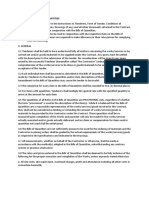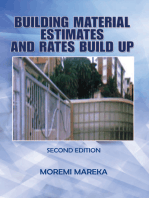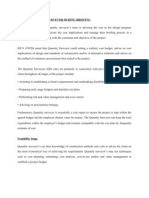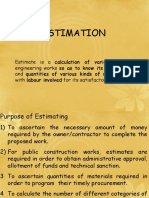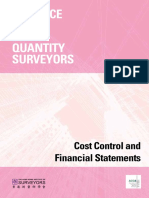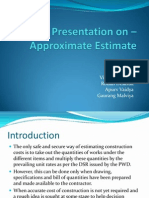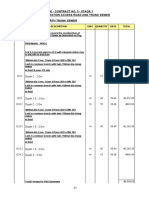Quantity Surveyor Role in Sustainability
Quantity Surveyor Role in Sustainability
Uploaded by
Ashley ChikodziCopyright:
Available Formats
Quantity Surveyor Role in Sustainability
Quantity Surveyor Role in Sustainability
Uploaded by
Ashley ChikodziCopyright
Available Formats
Share this document
Did you find this document useful?
Is this content inappropriate?
Copyright:
Available Formats
Quantity Surveyor Role in Sustainability
Quantity Surveyor Role in Sustainability
Uploaded by
Ashley ChikodziCopyright:
Available Formats
Quantity Surveyor Role in Sustainability
Nowadays increase the concept of sustainable development that give an exciting challenge for the
QS in this new era. The quantity surveyor duties in sustainable construction:
Green Costing
Life Cycle Costing/ Life Cycle Assessment
Carbon Footprint
Property Performance Reporting
Green Building Rating Assessment
Building Information Model (BIM)
Quantity Surveyor Duties in General Construction Project
Chung (2000) recognized that Quantity Surveyors duties are preliminary cost advice, cost planning
and value management, contractual methods. Moreover, tendering, choice of contractor, valuation
of construction work, project management and increased efficiency.
RICS (1999) pointed out some services of Quantity Surveyor should be provided during the different
stage of the project. In the pre-contract stage: Quantity Surveyor should prepare and develop
preliminary cost plan, advise on cost of design team’s proposals. Moreover, monitor cost
implications during the detailed design stage, maintain and develop cost plan.
For the tender stage: Quantity Surveyor should advise on the contractual documentation to clients.
Moreover, Quantity Surveyor also needs to prepare recommendations for interim payments, post-
contract cost control and final account. Furthermore, Quantity Surveyor should provide and price
bills of quantities, prepare cost analysis, advice on financial implications, advise on the use of areas
and provide a measurement of areas, provide advice on contractual matters.
quantity-surveyor-duties
Quantity Surveyor Role in RIBA Plan of Work
Here are the list of quantity surveyor duties and responsibilities in the different stage of RIBA Plan of
Work.
Quantity Surveyor Duties in Feasibility Stage
Preliminary Cost advice
Project Feasibility Study
Cost Planning and Budget Establishment
Quantity Surveyor duties in Design Stage
Budget Cost Control
Advice on Contractual methods and Tendering Procedures
Quantity Surveyor duties in Tender Stage
Advice on Selection of Contractors
Preparation of Expenditure Statements for Tax and Accounting
Technical Auditing
Quantity Surveyor duties in Construction Stage
Contract Documents
Project Control
Interim Payment
Evaluation of Variations
Other Functions
Assessment of Building Replacement Value for Insurance
Expert Evidence in Arbitration and Mediation
Represent the Employer/Client in Design and Build Contract
Evaluation of Life Cycle
Quantity Surveyor Duties and Responsibilities
Scope-for-a-Traditional-Quantity-Surveyors
Quantity Surveyor Job Descriptions
Here is summarized quantity surveyor duties and job descriptions from different countries. Such as
Australia, UK, Malaysia, Singapore, Sri Lanka, Canada, New Zealand, South Africa, and UAE. (source:
online QS vacancy advertisements)
The preparation of Bills and Schedules of Quantities of materials, labour and services required in the
construction and equipment of building, or engineering works.
Visit building sites to monitor progress.
Preparing tender and contract documents, including bills of quantities with the architect or the
client.
Preparation of specifications when required so to do.
Undertaking costs analysis for repair and maintenance project work.
Assisting in establishing a client’s requirements and undertaking feasibility studies.
Performing risk and value management and cost control.
Preparing and analysing costings for tenders.
Advising on procurement strategy.
Identifying, analysing and developing responses to commercial risks.
Allocating work to subcontractors.
Providing advice on contractual claims.
Analysing outcomes and writing detailed progress reports.
Valuing completed work and arranging payments.
Maintaining awareness of the different building contracts in current use;
Understanding the implications of health and safety regulations.
Areas requiring more specialised knowledge include: Offering advice on property taxation.
Providing post-occupancy advice, facilities management services and life cycle costing advice.
Assisting clients in locating and accessing additional and alternative sources of funds.
Enabling clients to initiate construction projects.
Advising on the maintenance costs of specific buildings.
QUANTITY SURVEYORQUANTITY SURVEYOR JOB DESCRIPTION
See more
Previous article
Type of Estimates
Next article
Grillage Foundation
SEARCH FOR:
Search …
SEARCH
RECENT POSTS
Learn Revit BIM Software – How to Import AutoCAD Files in Revit Software
Tools and Techniques for Project Management
Types of Finishes Using in Building Construction Process
Substructure Taking-off List
Factors Affecting Selection of Site – Building Construction Site Selection
© 2017 by Construction Tuts
You might also like
- Posb StatementDocument3 pagesPosb StatementDayana MhdNo ratings yet
- Pomi Boq SampleDocument15 pagesPomi Boq SampleShielu ManantanNo ratings yet
- Plumbing TakeoffDocument39 pagesPlumbing Takeoffshailesh goralNo ratings yet
- Pre Contract QS (Tendering Stage)Document2 pagesPre Contract QS (Tendering Stage)Emmanuel Sto TomasNo ratings yet
- Preamble To BoQDocument4 pagesPreamble To BoQGerard GovinNo ratings yet
- Traditional & Modern Quantity Surveying Practice - R0Document52 pagesTraditional & Modern Quantity Surveying Practice - R0danudmw86% (14)
- APC Standard Résumé Template: RICS Assessment of Professional CompetenceDocument3 pagesAPC Standard Résumé Template: RICS Assessment of Professional CompetencegokulthekingNo ratings yet
- QS PracticeDocument25 pagesQS Practicesarah67% (3)
- Cost Planning and Cost Estimating: By: Engr. Nelson S. Tapsirul Bsce, Mba, MSCMDocument22 pagesCost Planning and Cost Estimating: By: Engr. Nelson S. Tapsirul Bsce, Mba, MSCMNelson TapsirulNo ratings yet
- Manual For Quantity SurveyorsDocument42 pagesManual For Quantity SurveyorsThabo Piet-Buisanyang100% (4)
- History of The Roles and Responsibilities of Quantity SurveyorDocument9 pagesHistory of The Roles and Responsibilities of Quantity SurveyorFadil Icham JauffurNo ratings yet
- Quantity and Rate Analysis For Reinforced Concrete ConstructionDocument4 pagesQuantity and Rate Analysis For Reinforced Concrete Constructionvenkateswara rao pothina100% (1)
- Comparison of SMM7 With NRM2Document20 pagesComparison of SMM7 With NRM2Neminda Dhanushka Kumaradasa100% (1)
- Interim ValuationDocument7 pagesInterim ValuationNoman100% (1)
- BSR 1999 ColomboDocument487 pagesBSR 1999 ColomboMohamed Saheel100% (1)
- Mathematical Application & Statistics For Quantity SurveyingDocument7 pagesMathematical Application & Statistics For Quantity SurveyingOds GuysNo ratings yet
- Building Material Estimates and Rates Build Up: Second EditionFrom EverandBuilding Material Estimates and Rates Build Up: Second EditionNo ratings yet
- Role of Qs During BriefingDocument3 pagesRole of Qs During Briefingkhairul hazwan100% (3)
- Quantity Surveyor DutyDocument8 pagesQuantity Surveyor DutyDavid WebNo ratings yet
- Approximate QuantitiesDocument5 pagesApproximate QuantitiesRanjith Ekanayake50% (2)
- Measurement For Specialised WorksDocument98 pagesMeasurement For Specialised WorksAkhil Joseph100% (1)
- Quantity Surveying PracticesDocument4 pagesQuantity Surveying PracticesHimal Nilanka Rathnayaka0% (1)
- Comparison of SMM7 With NRM2Document21 pagesComparison of SMM7 With NRM2Mahesh JayawardanaNo ratings yet
- Quantity Surveyor Resume 7Document2 pagesQuantity Surveyor Resume 7GANESHNo ratings yet
- Preparation and Checking Interim ValuationsDocument3 pagesPreparation and Checking Interim Valuationsමනෝජ් තුඩුගල100% (1)
- ECM442 Lecture 1 Introduction Eng QuantitiesDocument69 pagesECM442 Lecture 1 Introduction Eng QuantitiesMUHAMMAD HAZWAN AIMAN MOHD FADZIL100% (1)
- Bills of Quantities For Building Are Divided Into The Following SectionsDocument2 pagesBills of Quantities For Building Are Divided Into The Following Sectionsnilmina100% (2)
- BSC in Qs and CM - Quantity Surveying PRDocument63 pagesBSC in Qs and CM - Quantity Surveying PReunice19970315No ratings yet
- 2-PP-Qty & Costing of Con Works-19!8!2016 (R0)Document32 pages2-PP-Qty & Costing of Con Works-19!8!2016 (R0)Dhanushka Wijesekara100% (2)
- Application of MRC in Civil Engineering BqsDocument15 pagesApplication of MRC in Civil Engineering BqsWan Haziq100% (1)
- Unit 46 Tendering and Estimating in ConstructionDocument14 pagesUnit 46 Tendering and Estimating in ConstructionThulasirajan KrishnanNo ratings yet
- Study On Different Types of Tenders, Tender Qualification/ Processing, Quantitative Techniques For Tendering, Planning and Monitoring-A ReviewDocument4 pagesStudy On Different Types of Tenders, Tender Qualification/ Processing, Quantitative Techniques For Tendering, Planning and Monitoring-A ReviewAanchal MishraNo ratings yet
- Introduction To MeasurementDocument20 pagesIntroduction To MeasurementAamaniVeeranam100% (1)
- Quantity Surveying Documents Notes Books HandbookDocument6 pagesQuantity Surveying Documents Notes Books HandbookGAURAVNo ratings yet
- Advanced Measurements 1Document25 pagesAdvanced Measurements 1Sachini0% (1)
- Quantity Surveying Vs Cost EngineeringDocument6 pagesQuantity Surveying Vs Cost Engineeringoption201060% (5)
- Measurement Beng. 010-1Document56 pagesMeasurement Beng. 010-1Richard Westony100% (2)
- Estimating 1 StudentDocument54 pagesEstimating 1 StudentKelly ObrienNo ratings yet
- Smm7 Estimate ExampleDocument42 pagesSmm7 Estimate ExampleDiasz100% (2)
- Technical Education & Vocational Training Authority: Government of The PunjabDocument30 pagesTechnical Education & Vocational Training Authority: Government of The Punjabqaiserkhan001No ratings yet
- RICSNew Rulesof Measurement PLPPresentation 20090520Document30 pagesRICSNew Rulesof Measurement PLPPresentation 20090520Kevin DonNo ratings yet
- Ppe 1 PDFDocument30 pagesPpe 1 PDFMahendra DewasiNo ratings yet
- CH 4 Methods of MeasurementsDocument20 pagesCH 4 Methods of Measurementsayman ehabNo ratings yet
- Practice Notes FOR Quantity Surveyors: Cost Control and Financial StatementsDocument7 pagesPractice Notes FOR Quantity Surveyors: Cost Control and Financial StatementsAliNo ratings yet
- Quantity Surveying Books 3 Info)Document6 pagesQuantity Surveying Books 3 Info)tharazain100% (1)
- Schedule of DayworksDocument2 pagesSchedule of DayworksAliyu Shehu100% (1)
- Approximate Estimate - Tendering and Contract EstimationDocument16 pagesApproximate Estimate - Tendering and Contract EstimationKaran Avad100% (1)
- Contractual Arrangements and DocumentationDocument13 pagesContractual Arrangements and DocumentationHafizah EzaniNo ratings yet
- Ictad Preliminaries Bill No 1 PDFDocument42 pagesIctad Preliminaries Bill No 1 PDFRrgs Bandara100% (2)
- Ictad 2008Document219 pagesIctad 2008Chathuranga Priyasaman100% (1)
- Quantity TakeoffDocument102 pagesQuantity TakeoffHELEN KEBEDENo ratings yet
- My Price FluctuationDocument18 pagesMy Price FluctuationRrgs BandaraNo ratings yet
- Pricing PreamblesDocument15 pagesPricing PreamblesSabeoNo ratings yet
- CESMM Exercise Lectures 16 and 17Document18 pagesCESMM Exercise Lectures 16 and 17slawek780303No ratings yet
- Chapter 2 - Duties & Services by QS - PRE CONTRACTDocument19 pagesChapter 2 - Duties & Services by QS - PRE CONTRACTHannan RuslimNo ratings yet
- Contract. EthicsDocument27 pagesContract. EthicsNeib Kriszah AlbisNo ratings yet
- Bill of QuantityDocument20 pagesBill of QuantityEgooNo ratings yet
- Current MeasurementDocument17 pagesCurrent Measurementrasitha11633% (3)
- Pre Contract Qs (Tendering Stage)Document2 pagesPre Contract Qs (Tendering Stage)Emmanuel Sto TomasNo ratings yet
- Quantity Surveyor: ImranDocument33 pagesQuantity Surveyor: Imrankhajaimad100% (1)
- Rashmi Kashyap - Cards Profile - 7 Years Ver - 1Document5 pagesRashmi Kashyap - Cards Profile - 7 Years Ver - 1ridhzkashyapNo ratings yet
- Schneider Electric Supplier Guidebook - July 2022Document21 pagesSchneider Electric Supplier Guidebook - July 2022techhustler2No ratings yet
- Architectural Design 7-ESQUISSE NO. 1Document4 pagesArchitectural Design 7-ESQUISSE NO. 1carlo melgarNo ratings yet
- Job Order Costing - Production LossesDocument1 pageJob Order Costing - Production LossesDerick FigueroaNo ratings yet
- DRGD 3rd Edition 1st Revision July 2021Document691 pagesDRGD 3rd Edition 1st Revision July 2021husnaNo ratings yet
- Literature Review of Jamuna BankDocument6 pagesLiterature Review of Jamuna Bankafdtakoea100% (1)
- FX Client Agreement EDocument46 pagesFX Client Agreement EPromise SegunNo ratings yet
- IIHR ProspectusDocument12 pagesIIHR Prospectusanil sajjanarNo ratings yet
- Muhammad Waleed Barya Draft Final +Document39 pagesMuhammad Waleed Barya Draft Final +rimshaNo ratings yet
- The Philippine Nation Brand - Gathering Insights From Established Nation BrandsDocument53 pagesThe Philippine Nation Brand - Gathering Insights From Established Nation BrandsAd VNo ratings yet
- En 10255 CertificateDocument2 pagesEn 10255 CertificatePPC Manager FectumNo ratings yet
- Sap SD TcodesDocument11 pagesSap SD TcodesPatan KhanNo ratings yet
- A Field Study On The Use of Process Mining of Event Logs As An Analytical Procedure in AuditingDocument24 pagesA Field Study On The Use of Process Mining of Event Logs As An Analytical Procedure in AuditingJ. RanNo ratings yet
- Chapter 6Document10 pagesChapter 6Gizaw BelayNo ratings yet
- Wipro PARIDocument14 pagesWipro PARITarushi JainNo ratings yet
- Utopian CapitalismDocument324 pagesUtopian CapitalismAlex AcuñaNo ratings yet
- Contemporary Development in Business Management SIM 337 2022Document19 pagesContemporary Development in Business Management SIM 337 2022Đinh MinhNo ratings yet
- Crypto CourseDocument2 pagesCrypto CourseKatieNo ratings yet
- Lesson 9 - Marketing and Sales (Revised)Document19 pagesLesson 9 - Marketing and Sales (Revised)Sohail AzharNo ratings yet
- GR 11 Bank Reconciliation NotesDocument6 pagesGR 11 Bank Reconciliation Notesaphiwe.ndlovu1No ratings yet
- The EC Contract With AstraZenecaDocument41 pagesThe EC Contract With AstraZenecaMarcus ChillerNo ratings yet
- Reference 2Document10 pagesReference 2Ahmad Tafaqquh FiddiinNo ratings yet
- Case List On Torts and Damages (1718-2) Updated PDFDocument6 pagesCase List On Torts and Damages (1718-2) Updated PDFDoms ErodiasNo ratings yet
- Economics Question Bank - Docx - 1610116234978 PDFDocument137 pagesEconomics Question Bank - Docx - 1610116234978 PDFJeremiah NakibingeNo ratings yet
- Streamline Your GST With ServicesPlus Billing SoftwareDocument7 pagesStreamline Your GST With ServicesPlus Billing Softwaremanshi.techalphonicNo ratings yet
- Eap5 - Research - Dang Ngoc Vuong Nhi - 21000885Document8 pagesEap5 - Research - Dang Ngoc Vuong Nhi - 21000885Vuong Nhi Dang NgocNo ratings yet
- SPIN-selling Notes SPIN-selling NotesDocument4 pagesSPIN-selling Notes SPIN-selling NotesAayush SinhaNo ratings yet
- Science Gateway NotesDocument8 pagesScience Gateway NotesOmaima MusaratNo ratings yet
- Vocabulary For Travel & TourismDocument4 pagesVocabulary For Travel & TourismJagjeet BehniwalNo ratings yet




